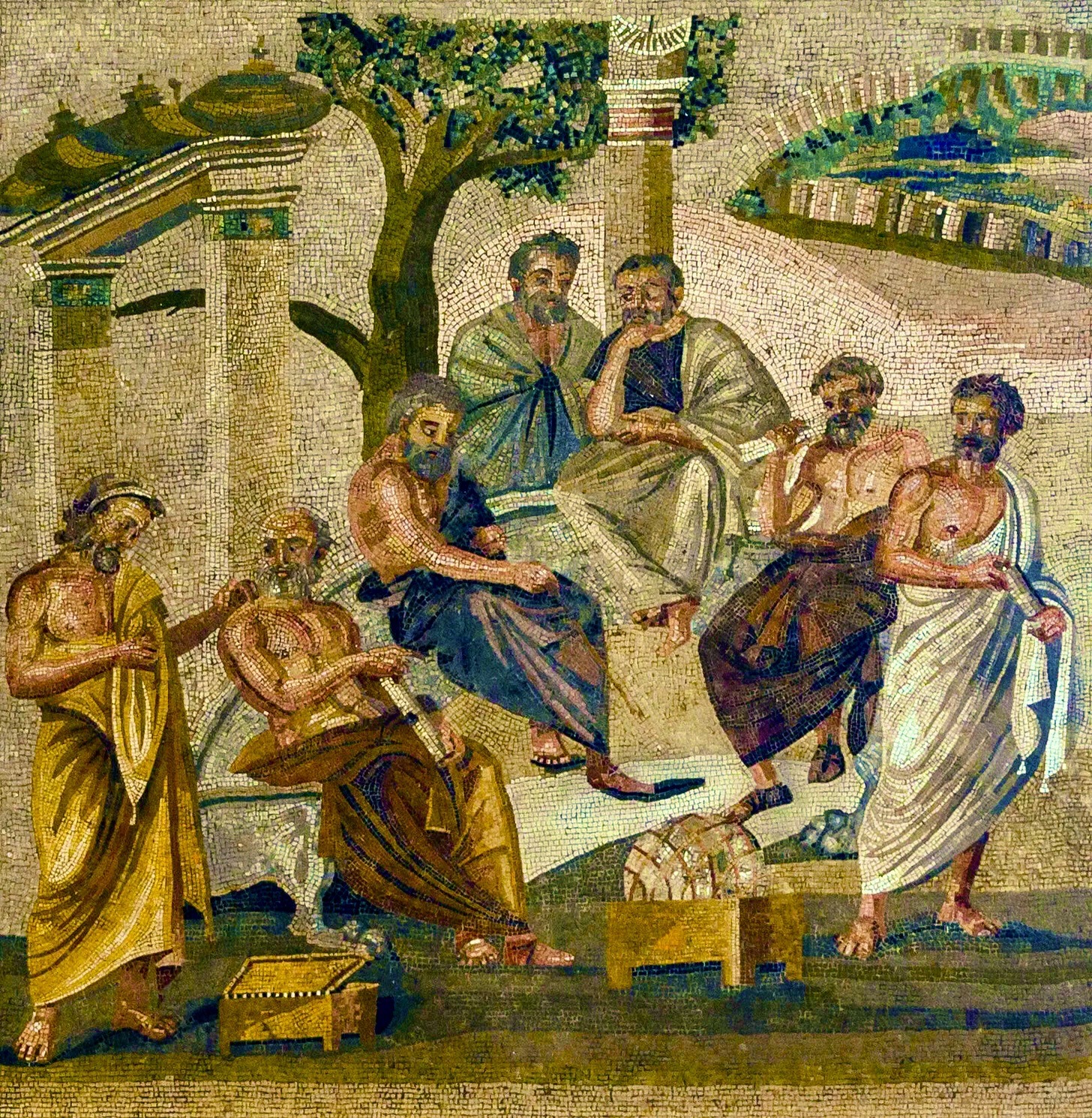
The Academy of Plato. Mosaic from Pompeii, Villa Siminios Stephanos. 1st century. Museo Archeologico Nazionale, Naples. Wikipedia Commons
Plato, 428-348 BCE, grew up in a war-ravaged Athens fighting the Peloponnesian War, 431-404 BCE. This civil conflict nearly wrecked Greece. Athens and its Greek allies fought Sparta and its Peloponnesian allies for 27 years. Why? Because Sparta had nightmares over expanding Athenian influence and power. Fear of Sparta of Athens triggered the Peloponnesian War. Persia, that had invaded Greece twice in early fifth century BCE, funded Sparta.
The Peloponnesian War ended the golden Age of Athens that started with the Greek defeat of Persian invaders of Greece during 490 and 480-479 BECE. The pride of Greeks for defeating the world’s largest empire became renewal, confidence, philosophical reflections, science, technology and beautiful architecture and art, the crown of which was the rebuilding of the Parthenon in Athens in order to honor Athena, patron goddess of Athens.
Plato
Plato, perhaps the greatest moral philosopher of Greece, founded the Academy sometimes in the 380s BCE for restoring the Greeks’ confidence in their millennial traditions of working together, eusebeia (piety) for the gods, and for peaceful and good life guided by laws and intelligence expressed in moderation (σωφροσύνη) and science (επιστήμη).
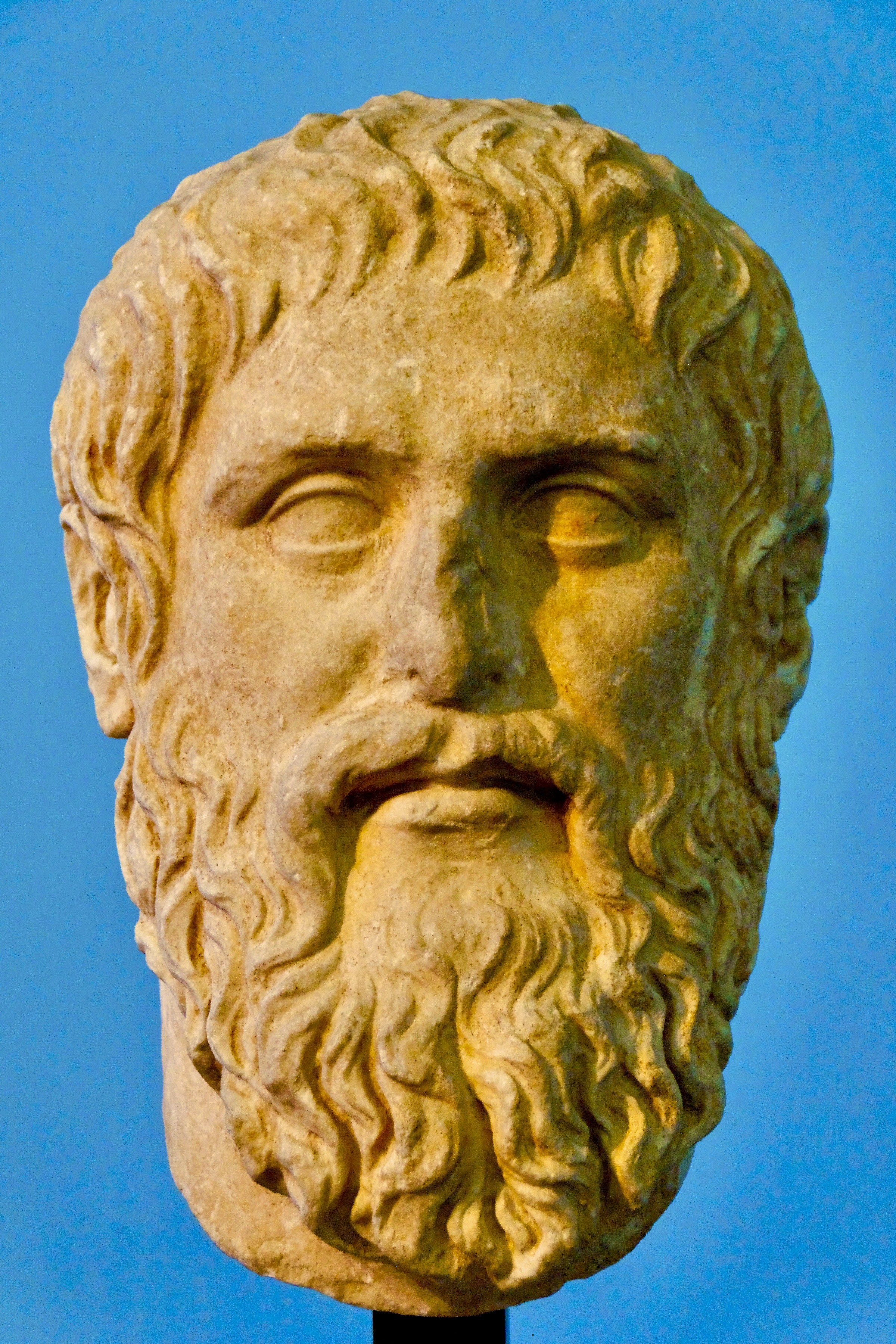
Plato. Marble copy of the portrait made by Silanion ca. 370 BCE for the Academy in Athens. Musei Capitolini, Rome. Public Domain. Wikipedia Commons
Plato certainly knew that even the gods made their decisions together. Democracy started with the gods. They formed assemblies.
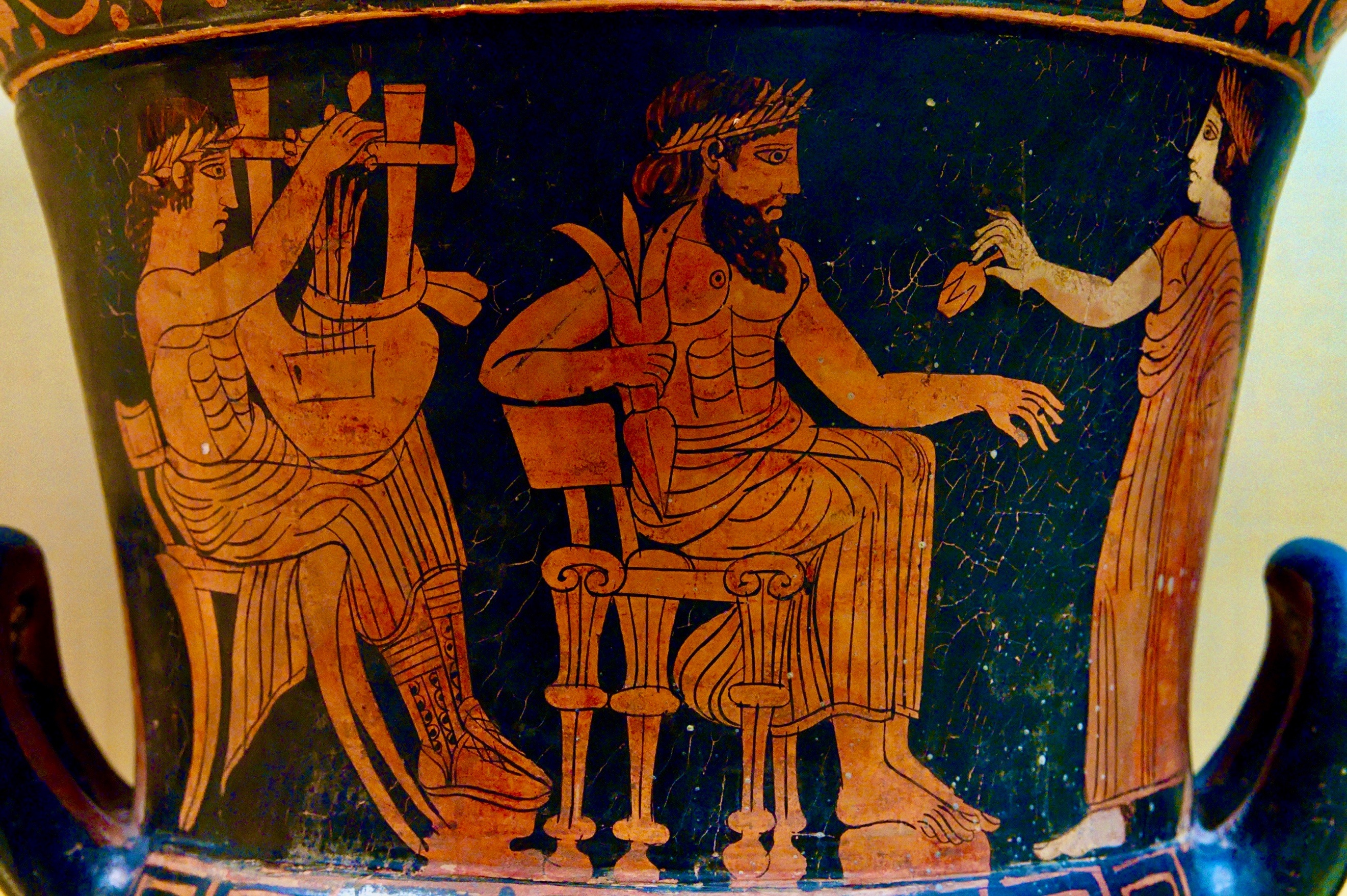
Olympian assembly. From left to right: Apollo, Zeus and Hera. Etruscan red-figure calyx-krater, 420–400 BCE – during the Peloponnesian War. From Etruria that thrived on Greek culture. National Archaeological Museum, Athens. Photo: Marie-Lan Nguyen. Wikipedia Commons
Platonic Academy
However, we don’t really know why Plato started the Academy in the midst of a sacred grove of olive trees, on sacred ground honoring Athena and the other gods. But we do know that slowly the Academy became a university for philosophers and scientists who advanced knowledge, mathematics, science, political theory and philosophy. It lasted for some 900 years and became seed of science and civilization. In fact, Aristotle, 384-322 BCE, spent 20 years studying under Plato. Aristotle invented science and changed the world.
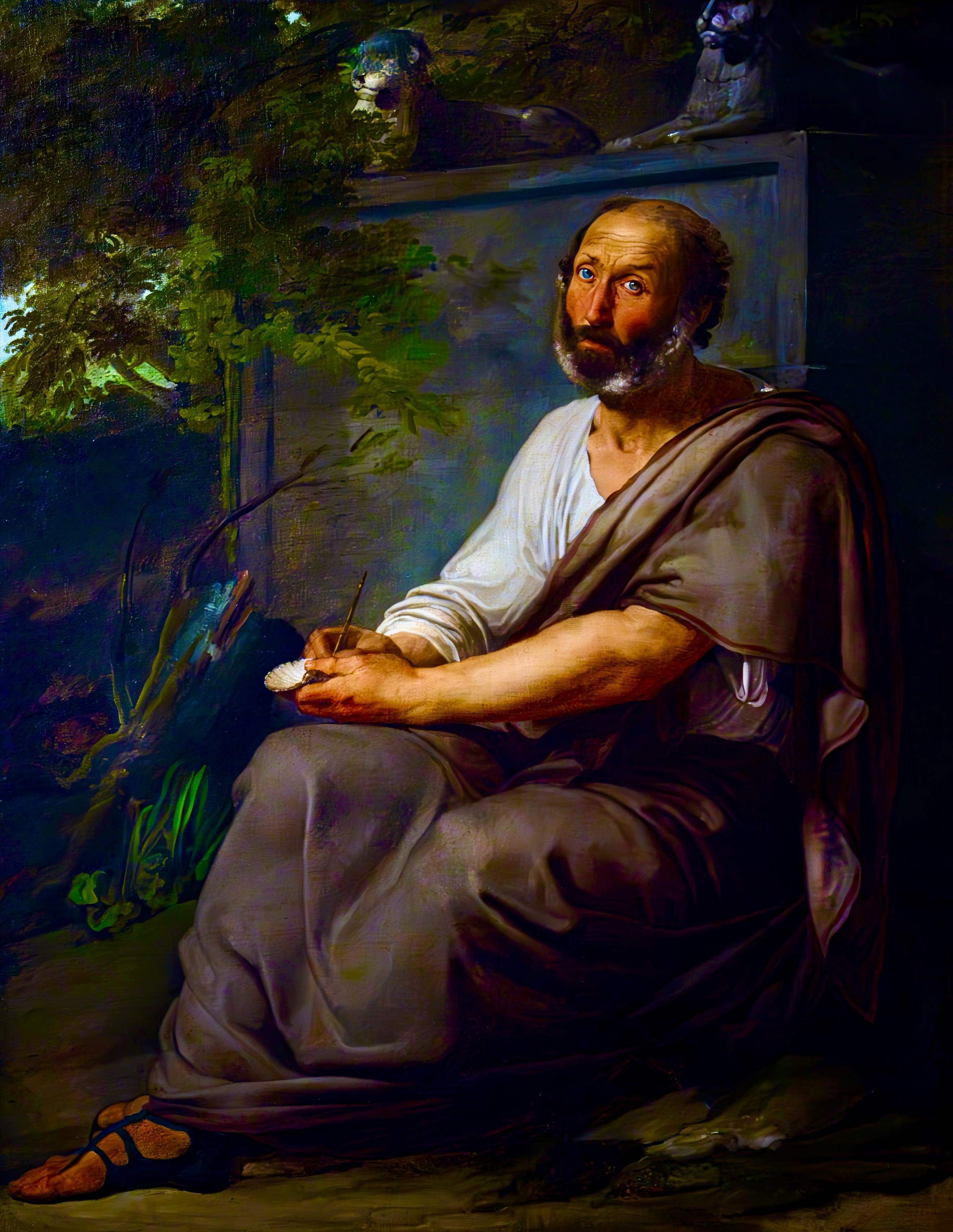
Aristotle by Francesco Hayez, 1811. Gallerie dell’ Academia, Venice. Wikipedia, Public Domain
Aristotle translated Plato’s dream of a philosopher king. He tutored Alexander the Great, teaching him history, international relations, science and poetry. He convinced him to unite the Greeks and end the Persian danger. Alexander united Greece and conquered Persia. His overall influence was incalculable. He created an ecumene of science and civilization.
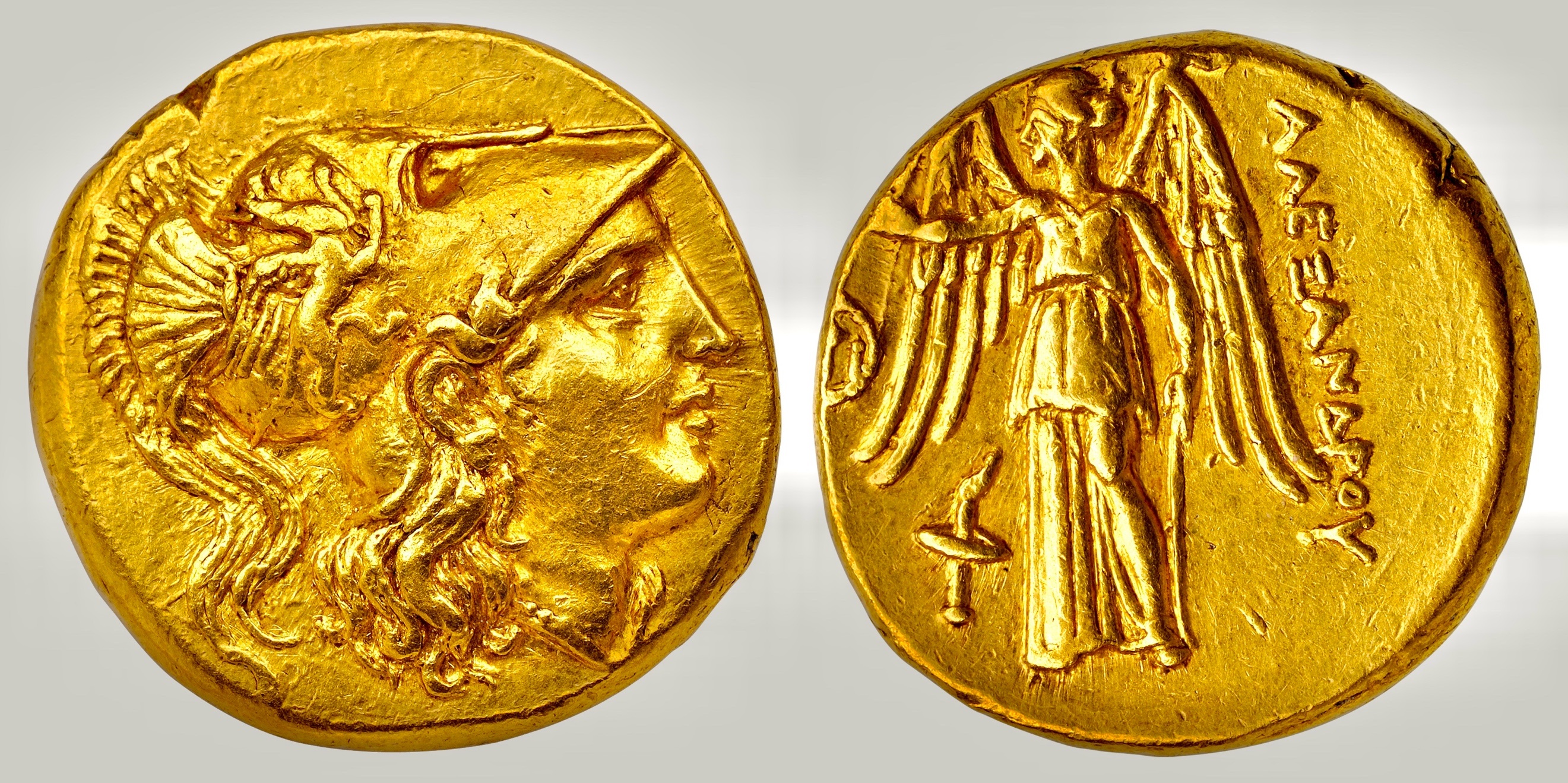
Gold stater issued about 322-318 BCE, depicting Alexander and goddess Nike (Victory). Nike, right, is crowning the victories of Alexander. Courtesy Collection Saroglou, Numismatic Museum, Athens.
We are who we are because of the work of Plato, Aristotle and Alexander. History matters.
Reviving the Academy of Plato and Aristotle
I am not writing a history of Plato, Aristotle or Alexander. I am reviving these great men because their thought may, once again, save humanity from another dark age.
The fourth century BCE is not too dissimilar to the twenty-first century. These centuries were products of war. Plato and Aristotle explained heavens and Earth. They left valuable works on politics, life and the Cosmos. They tried to secure a safe and satisfying future for the Greeks. This vision did transform Greece into a global power of light, science and civilization for at least three centuries. And despite Rome’s capture of Greece in 146 BCE and, eventually, in the fourth to sixth centuries, the savage destruction of Greek culture by Christianity, the ideas of Plato, Aristotle, Alexander and dozens of Greek artists, philosophers, scientists and poets saved the world from darkness. The eighth-tenth centuries Arabic Renaissance and the fifteenth century Renaissance in Padua, Florence and Venice were manifestations of Greek Renaissance.
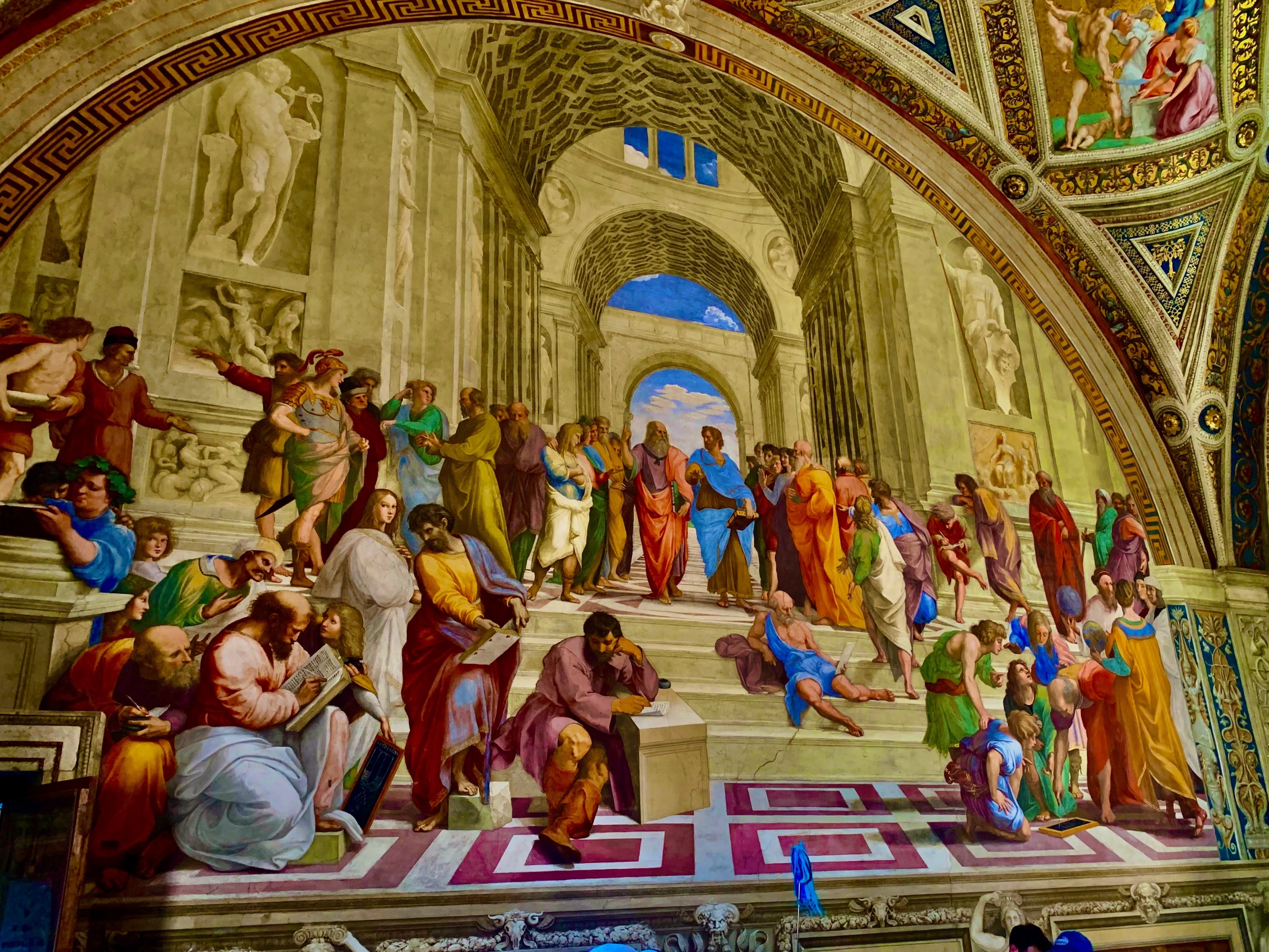
School of Athens by Raphael, 1509-1510, depicting Plato and Aristotle surrounded by other Greek thinkers, including Alexander the Great, upper left. Vatican Museum. Courtesy Kevin Moffett.
This is the reason I am proposing the founding of a Platonic – Aristotelian Academy to save the world from another dark age or extinction through rising climate chaos and possible nuclear war. The P-A Academy would be international for the best minds willing and capable to save civilization and planet Earth. The Academy would be a global university from which scholars and politicians would learn and be inspired from Plato and Aristotle to defend civilization and protect the biodiversity of nature that makes life possible.
In their time, the fourth century BCE, Plato and Aristotle, strengthened ethical and political life and turned the attention of the Greeks to the virtues of justice, moderation, science and civilization. Aristotle invented science (zoology, meteorology) and his student, Theophrastos, invented botany. Moreover, Aristotle, explained the nature and philosophy of science in the Posterior Analytics, Metaphysics, Meteorology and works on animals. Science (επιστήμη from the verb επίσταμαι, γνωρίζω καλώς, I know well documented facts, truth). He studied the Cosmos, and, in his Politics and Constitution of Athens, he explained the political theory behind Greek pollical life. He created civilization. His thought includes Plato. But Aristotle remains firmly grounded on the virtues of Greek science, civilization and planet Earth. As for Plato, he wrote dialogues that examine the metaphysical, intellectual and political life of citizens and the Cosmos.
Nuclear weapons: madness of power
We need the ideas of Plato and Aristotle to solve our own political and scientific problems. These are existential problems we have created from, first, incorporating dogmatic ideologies that clash with the virtues and logic of Greek thought. Second, willfully, the West misused the idea of science we inherited from the Greeks. Science became a weapon for biological, conventional and nuclear war.
Why, for example, should the US, Russia, China, India, Pakistan, North Korea, England, France and Israel (and possibly Iran) have existential nuclear weapons? Those weapons are useless for protecting national security and, much less, freedom. In fact, they are designed to kill civilians and wipe out life and civilization. “In the nuclear era, city-busting weapons would be a dime a dozen and would spread from the superpowers to many other countries…. Targeted by the planet’s major nuclear arsenals would be the civilian inhabitants not just of single cities but of scores and scores of cities, even of the planet itself.”
This dogmatic and fanatical madness was confirmed by General George Lee Butler, former director of the US Strategic Command, STRATCOM. This military organization controls nuclear bombs and their potential deployment against “enemies.” He admitted we made it by the skin of our teeth: We “survived,” he said, the Nuclear Weapons Era “by some combination of skill, luck, and divine intervention, and I suspect the latter in greatest proportion…. By what authority do succeeding generations of leaders in the nuclear-weapons states usurp the power to dictate the odds of continued life on our planet? Most urgently, why does such breathtaking audacity persist at a moment when we should stand trembling in the face of our folly and united in our commitment to abolish its most deadly manifestations?” He urged Americans to stop sanctifying nuclear weapons and return to civilization.
Yes, indeed, nuclear bombs are merely mighty bombs that utterly kill life and civilization. This would be a core question for the scholars and politicians of the Plato-Aristotle Academy to investigate and then proceed to convince the leaders and people of the world to abolish the nukes before they abolish us.
Climate chaos
The other crucial and existential problem threatening humanity is rising global temperatures from the century-long burning of fossil fuels. The November 14, 2023 US Fifth National Climate Assessment summarizes the tragic condition in the United States:
“Climate changes are making it harder to maintain safe homes and healthy families; reliable public services; a sustainable economy; thriving ecosystems, cultures, and traditions; and strong communities. Many of the extreme events and harmful impacts that people are already experiencing will worsen as warming increases and new risks emerge.”
“Global greenhouse gas emissions from human activities continue to increase, resulting in rapid warming and other large-scale changes, including rising sea levels, melting ice, ocean warming and acidification, changing rainfall patterns,
and shifts in timing of seasonal events. Many of the climatic conditions and impacts people are experiencing today [2023] are unprecedented for thousands of years… Across all regions of the US, people are experiencing warming temperatures and longer-lasting heatwaves. Over much of the country, nighttime temperatures and winter temperatures have warmed more rapidly than daytime and summer temperatures. Many other extremes, including heavy precipitation, drought, flooding, wildfire, and hurricanes, are becoming more frequent and/or severe, with a cascade of effects in every part of the country.”
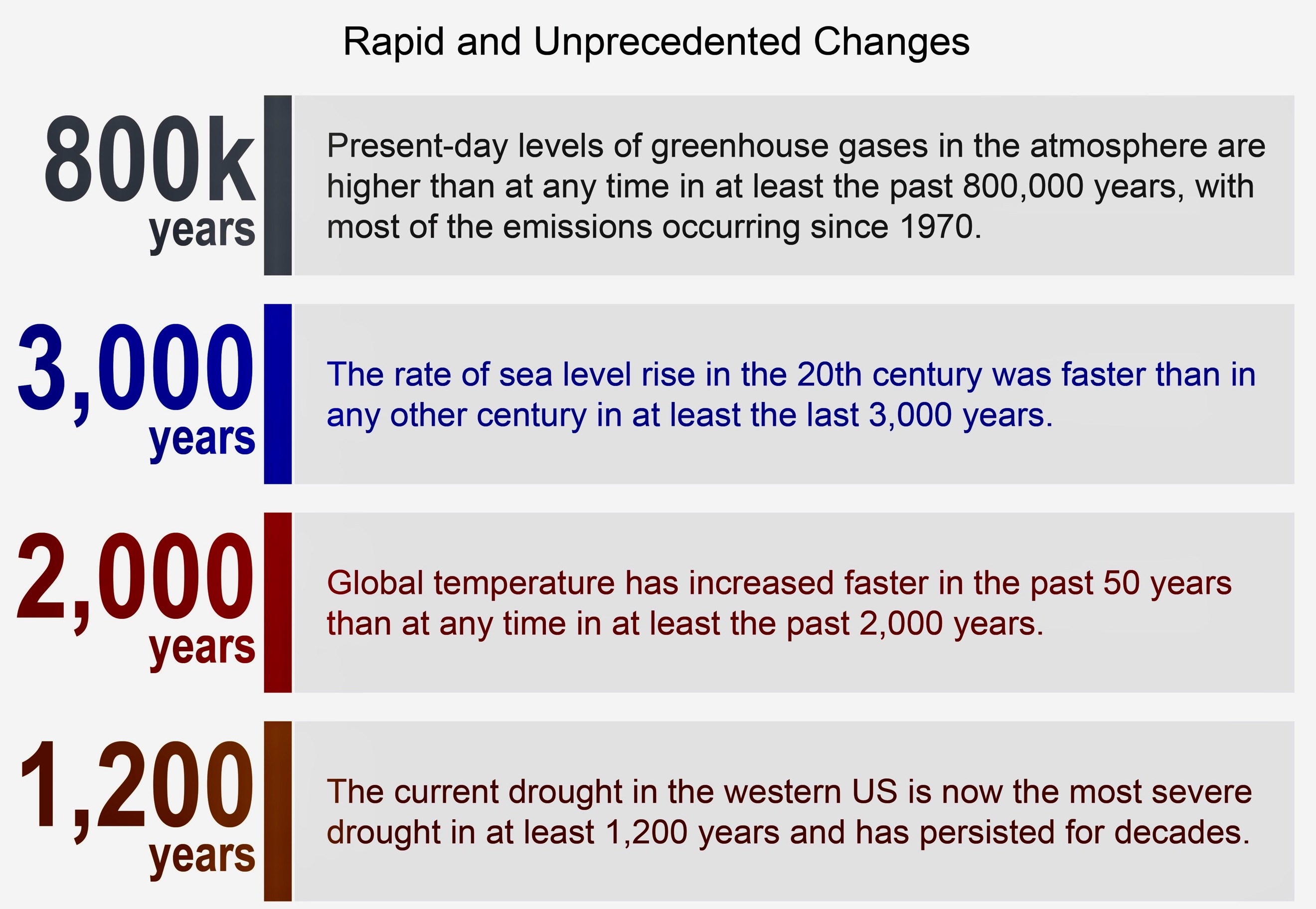
Human activities, and especially the burning of fossil fuels, for more than a century have led to increases in the atmosphere of greenhouse gas concentrations that are unprecedented in history spanning hundreds of thousands of years. Figure credit: US Global Climate Research Program.
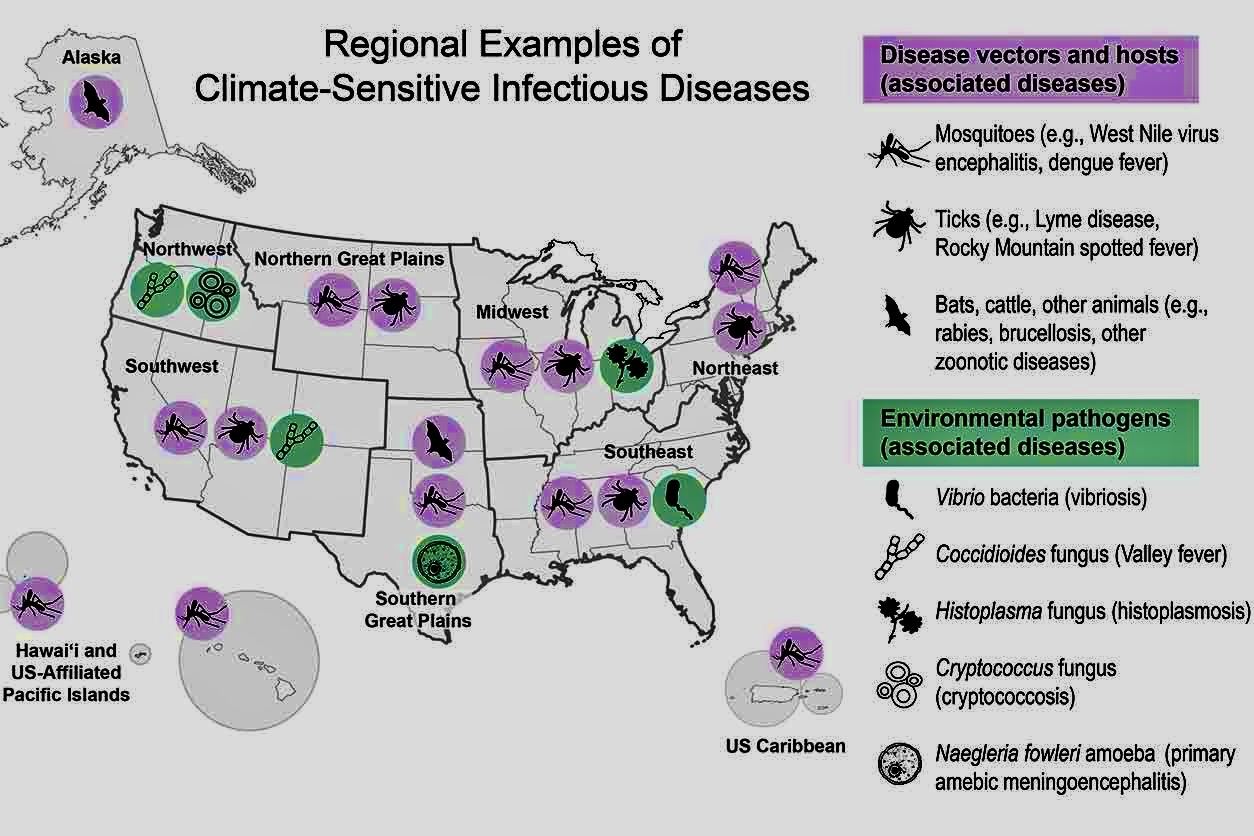
Climate chaos intensifies the spreading of disease and disease vectors. USGCRP, US Fifth National Climate Assessment, Nov. 14, 2023.
The Trump administration deleted the Website stoting the Report of the Fifth National Climate Assessment. The National Archives preserved these warnings of the Fifth Climate Assessment Report:
“One of the most direct ways that Americans experience climate change is through increases in the frequency and intensity of extreme weather events. So far this year [2023], the United States has already experienced 25 weather and climate disasters that each resulted in more than a billion dollars of damages, costing hundreds of lives and more than $73 billion total…. Climate disasters that occur in one region of the United States can have cascading or compounding effects in other regions. For example, wildfires in one region can worsen air quality and health in other regions. When hazards occur in different regions but at the same time, such as the simultaneous megafires that burned across multiple western states and record back-to-back Atlantic hurricanes in 2020, these compounding disasters can put unprecedented demand on federal emergency response resources. Climate change also interacts with other stressors, such as the COVID-19 pandemic and social inequities, which can multiply harm and further increase demand for resources that are needed when responding to disasters. This is particularly true for overburdened communities. These interactions can lead to cascading impacts that cross state and national borders. For example, both gradual changes in average climate conditions (e.g., shifts in temperature and precipitation) and extreme events (e.g., floods, droughts, and wildfire) can shock the global food supply chain and lead to food insecurity, geopolitical instability, and mass migration. These cascading and compounding impacts affect people’s well-being, our economy, and our national security.”
Conclusion
The valiant and persistent teaching, writing, and politics of Plato’s Academy gave birth to Aristotle, who taught Alexander the Great, who disseminated the Aristotelian science and civilization to Alexandria and the world. From that humble beginning we had the Alexandria Library, Mouseion / University and the theoretical construction of a better world. Ideas and manuscripts from that Greek Enlightenment gave birth to Renaissance among the Arabs and the Europeans, thus setting the foundations of our world.
We have an opportunity to rekindle that vast Human desire for a good life and survival. The Platonic-Aristotelian Academy, properly funded and administered, has the precedent of the Platonic Academy and some 2,400 years of history to spread wisdom, moderation and Aristotelian science for a livable future. Civilization and our beautiful life-giving Earth demand it, that we abolish nuclear weapons and stop setting the planet on fire.
The post Do We Need a Platonic – Aristotelian Academy? appeared first on CounterPunch.org.
This content originally appeared on CounterPunch.org and was authored by Evaggelos Vallianatos.